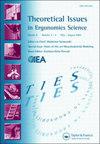Identifying and understanding individual differences in frustration with technology
IF 1.4
Q4 ERGONOMICS
引用次数: 1
Abstract
Abstract Individual differences in user responses to malfunctions with technology are of primary interest, as this influences how a product can be improved and has not been examined extensively. Previously, individual differences in responses to technology failures have been examined in self-reported studies, but not in an experimental design. The current study expanded the findings from previous research with a mixed factorial design. Seventy-two (N = 72) undergraduate students were recruited to participate in this online study. They were asked to complete a shopping task and complete a survey about their experience. To examine individual differences in responses to technology failures, several repeated measures ANOVAs, multiple regressions, and hierarchical regressions were conducted to assess the effects of expectation and malfunction on frustration and performance. Results revealed individuals with a greater tendency to be neurotic or extraverted also tended to be more frustrated by a technology malfunction. Additionally, openness was the strongest predictor of less frustration with technology failures, while extraversion was the strongest predictor of more frustration with technology failures.识别和理解对技术的挫折的个体差异
摘要用户对技术故障反应的个体差异是最重要的,因为这会影响产品的改进方式,并且尚未得到广泛的研究。以前,在自我报告的研究中已经检查了个人对技术故障反应的差异,但在实验设计中没有。目前的研究采用混合因子设计扩展了先前研究的结果。七十二(N = 72)名本科生被招募来参与这项在线研究。他们被要求完成一项购物任务,并完成一项关于他们经历的调查。为了检验对技术故障反应的个体差异,进行了几个重复测量ANOVA、多元回归和层次回归,以评估期望和故障对挫折感和表现的影响。结果显示,更容易神经质或外向的人也更容易对技术故障感到沮丧。此外,开放性是减少对技术失败的沮丧情绪的最强预测因子,而外向性是增加对技术失败沮丧情绪的最有力预测因子。
本文章由计算机程序翻译,如有差异,请以英文原文为准。
求助全文
约1分钟内获得全文
求助全文

 求助内容:
求助内容: 应助结果提醒方式:
应助结果提醒方式:


